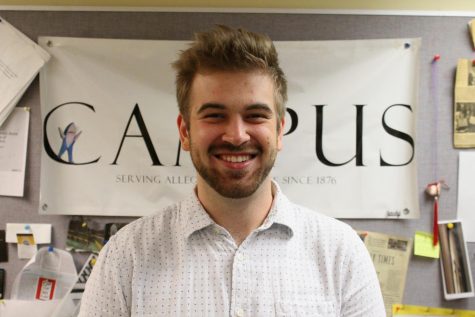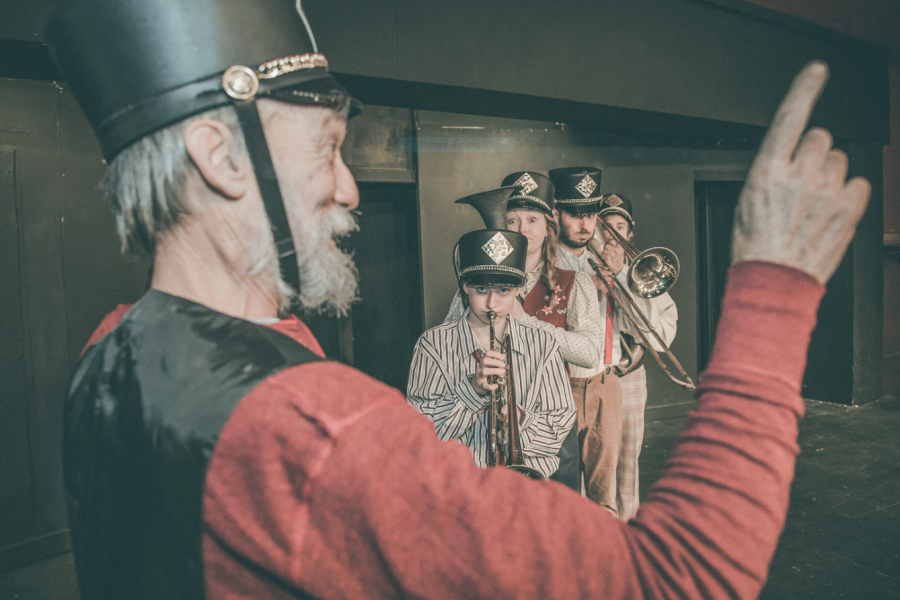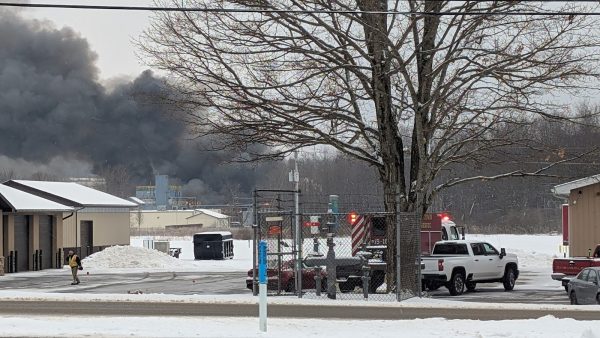‘Light in Odd Spaces’
Community theatre explores Oddfellows Hall’s history
Photo contributed by A Neu Image
Doug Lodge acts as the director of the Oddfellows orphanage marching band. The band, from front to back, is Ahmaya Andrews, Autumn Vogel, Lee Scandinaro and Dan Winston.
A farmhouse, an orphanage, an elusive society, a preschool, an academic building: Many have called Allegheny College’s Oddfellows Hall home over the near-150 years it and a smaller predecessor have sat atop the hill. With each change in purpose, new rectangular arms were added to the structure, creating the misshapen, elaborate corridors reaching out across a grassy field on which children still play.
The many types of relationships binding generations of Meadville residents and Allegheny students to the aging building are explored in Meadville Community Theatre’s upcoming “Light in Odd Spaces.” An original production collaboratively devised by the company members, the play is directed by Beth Watkins and will be performed next weekend inside the building that inspired it.
“It’s both a celebration and a kind of an elegy to the building,” said Joshua Searle-White, the MCT president who also performs in the play.
Oddfellows is haunted, according to Allegheny lore and the experiences of many a humanities professor, whose offices line the northernmost wing of the building. That belief combined with questions about the building’s future, Searle-White explained, provided the original inspiration for the show: A local magician was scheduled to do a show and thought a “séance-y tour” of the building would draw quite a crowd.
“Ultimately, he wasn’t able to do that piece,” Searle-White said. “But I got the idea, ‘Oh wow, we should do something about the building because it’s likely to be at least mothballed, if not torn down soon.’”
Searle-White sought out Watkins, recently retired from her position as theater professor at Allegheny, to spearhead the project because he had previously seen and been enamored by her devised theater productions. While play scripts are typically the product of one or two writers, devised productions are developed collaboratively by the entire company involved in the show. At the approval of the MCT board, Watkins began research for the project.
“Devised theater can mean a lot of things to a lot of people, but fundamentally the way I define it is that you begin with a group of people and an idea,” Watkins said last week. “There is no script. When you do a play production, what you all have in common is the script. But when you devise you really begin without that, it’s more of just an idea.”
The “Odd Spaces” company ranges in age from 11 to late 60s, according to Searle-White, and is composed of Allegheny College students and retired faculty, Meadville City Council members, MCT veterans, and city residents who were itching to participate.
The production’s parameters were loose, according to Watkins and Searle-White. Some scenes are puppet-centric, while others are full musical numbers, the songs composed by Searle-White and Bob Michel, a friend of Watkins. Dance and Movement Studies instructor Besty Sumerfield also contributed as a choreographer for a few numbers. Watkins explained that those who come solely for a tale about the Oddfellows society will be surprised, and those who come for a historic piece on the building will also be equally surprised.
Common across all the genres, modes and personal flairs that make up the eclectic show is the shared love for the idea that Oddfellows Hall holds stories greater than one person could tell.
When the group first got together in March 2022, Watkins sent everyone to walk the halls, then asked them to write about their experience. Searle-White’s writing, for example, morphed into a speech he gives as part of the play.
“I collected (the writings) up, and if not every single one, virtually all of those are represented in the play either in full script or in a portion of it,” Watkins said. “Because they were really powerful, they discovered really interesting things.”
Dan Winston, a 2010 Allegheny graduate who now works as a teacher in Meadville, has worked with Watkins on a number of other devised theater projects and has performed in the MCT since he was 11. Winston explained that the concrete nature — in the literal sense, as the others had been inspired by concepts such as “electricity,” “dirt” and “death” — of this piece makes it different from any other of Watkins’ projects he’s participated in.
Beyond personal exploration and writing, Winston and his fellow company members were asked to interview at least two sources who had a connection to the building, ranging from professors who work there or Meadville Cooperative Preschool alumni to adults who had been raised in the Odd Fellows orphanage.
For his part, Winston interviewed a former Allegheny student as well as a founder of the MCT. Launched in 1967, the theater moved to Oddfellows in 1983.
Winston was struck by the intense emotion the building evoked within his two interview subjects. The student described nights she would crawl onto the roof of Oddfellows to gaze down at campus and Meadville below, and the MCT founder provided anecdotes that align with the similar mythos the building has today.
“One in particular was that one member of the early theater group was the wife of a former director of the orphanage,” Winston said. “There was a tragic story about him running into legal trouble over some financial stuff … but he actually ended up taking his own life within the building, at least according to legend. (The founder) talked about walking through the building, alone at night, kind of feeling the presence of some spirit of something.”
Like so many legends associated with the building, however, company members were unable to confirm the veracity of the story.
Between rehearsals in the tiny theater that, like the building as a whole, has seen better days, Watkins would curate the collected material. When they next met, she would give the group a selection she found intriguing and ask them to create something from it, be it a monologue, choreography or other type of art or performance, according to Winston. From there, curation began once more, the group continuing to laminate their creativity and research until the production began taking shape.
Watkins called the process “accidental collaboration.”
“I mean, this kind of thing happens all the time when you’re devising,” Watkins said. “You can’t plan it, it just …”
“Happens,” chimed in Brian Thummler, piano accompanist and artistic collaborator for the production.
“Right,” Watkins replied. “Well, it happens because we create the conditions for it to happen.”
For the production, Thummler created a “crankie” — a type of moving panorama — based on a video that production contributor Sydney Emerson, ’23, shot of chimney swifts circling their roosts in Oddfellows’ roof. For Searle-White, who contributed a song about the swifts, the swirling birds beg the question: What happens when this building goes away?
While the college has made no formal announcement on the future of Oddfellows Hall, Winston remarked that he believes it will most likely be demolished within the next decade or two. The college’s 2019 campus master plan lists “decommissioning” of the 55,000 square foot building among several high-priority recommendations.
“In taking a tour of the building, we got to see parts that the general public, like students and theater people, don’t see, and it is kind of a mess,” Winston said.
Winston described holes in the ceiling, walls with exposed insulation and rooms flooded and abandoned for decades. He believes the cost of restoration will prove too high.
“What will take its place?” Winston said. “I don’t know. Another dormitory, or another academic building to replace it, or just, you know, a f—— parking lot. I don’t know. But it gives a special kind of weight to being a part of telling the story of this building.”
“Light in Odd Spaces” opens on Friday, Jan. 27 at 7:30 p.m. in the Meadville Community Theatre, with additional showings on Saturday, Jan. 28 at 7:30 p.m. and Sunday, Jan. 29 at 2 p.m. Tickets are available at the door or on the Meadville Community Theatre’s website.

Roman Hladio is a senior from Wexford, Pennsylvania. He is studying English with a creative writing emphasis, and completing requirements for a Journalism...










